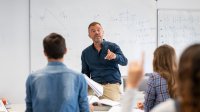3 Ways to Help Expert Teachers Get Even Better
Small shifts in practice are often all it takes for an expert teacher to reach the next level in the classroom.
Your content has been saved!
Go to My Saved Content.In a 2003 study, researchers in Australia found a substantial divide between experienced teachers and expert teachers. One of the key differences was the amount of time a teacher spent working with students across levels of complexity of learning. For instance, experienced teachers spent 70 percent of their time in their classroom teaching students surface-level content and about 30 percent of their time teaching deep-level knowledge. Expert teachers do just the opposite. This variance causes a significant impact on the learning lives of children.
Imagine students were expected to learn about the foundations of the U.S. democracy. Experienced teachers are likely to spend the majority of their time covering factoids such as defining and labeling major documents (e.g., the Declaration of Independence), major players (e.g., Alexander Hamilton) and important locations (e.g., Philadelphia).
Expert teachers would spend the majority of their time comparing and contrasting the forms of government between the forming nation and the British monarchy. They certainly dig into the surface-level knowledge, but that knowledge is used to better understand and apply to key themes. Expert teachers default to deep learning; experienced teachers cover surface knowledge.
In a recent metasummary on expertise in teaching, researchers found that expert teachers have a set of characteristics that drive and distinguish their performance, including these:
- They know and respond to their impact. A common habit is to reflect on their practice in relation to student evidence.
- They approach learning through a balanced pedagogy. A common habit is to use a variety of instructional strategies to meet students across a range of complexity levels.
- They are adaptive. A common habit is to adapt their plans and actions in the moment based on student need, yet remain focused on core outcomes of learning.
Every school leader has experts in their schools. The question is how do leaders ensure that expert teachers continue to grow and thrive? One way to do this is to promote small, innovative steps in current practice and have expert teachers analyze the impact of their practice and their learning.
From Deliberate Practice to Deliberate Deviations
When we are first learning a practice, we are attempting to do it right. We are pursuing fidelity to practice. To ensure fidelity, we engage in deliberate practice. We work on a strategy over and over, and with corrective feedback we improve. Over time, we develop proficiency and can illustrate our impact through student evidence.
There comes an inflection point when we begin moving from deliberate practice of one strategy to a collection of strategies that meet the same outcome. We move from needing corrective feedback to approximate feedback. This is where innovation lies. Steven Johnson, the author of Where Good Ideas Come From: The Natural History of Innovation, argues that innovation is finding the “adjacent possible,” the small shift in practice that is doable and may unlock the potential for new innovations.
This is more about thinking across boxes than thinking outside the box. Expert teachers need to explore the adjacent possible and attempt small deviations on their practice.
3 Ways to Help Expert Teachers Improve Their Practice
1. Encourage small shifts that take advantage of the power of “how.” Expert teachers are focusing on so many ideas, strategies, and issues that any changes must be small and doable. This is often easier said than done. Here are a few questions to prime their thinking:
- What would be one small shift in your practice that may unlock new learning for you and your students?
- How do you ensure that you stick to this small practice for _____ (time frame)?
- How will you ensure that you don’t scale the practice until you have learned about your impact?
- How can I best support you in this endeavor?
2. Ensure that teachers make the new practice and its impact observable through the power of “what.” Expert teachers crave evaluating their impact and determining next steps. They understand the value and need for observable impact of their practice on student learning. As such, these questions are welcomed and get them to begin thinking through impact and what their journey may look like initially as well as a few weeks or months down the road.
- What will you see as a result of this approach?
- What evidence will you collect to determine the impact of your practice?
- What are you expecting from this evidence in the first few days, weeks, and months?
3. Have teachers bracket these new experiences through the power of “when.” Experts are making so many tacit decisions each day that they don’t often think about their instructional moves at the moment. To prime expert teachers to think about their practice, we need to have them visualize the moments before and after they are going to engage in the habit, as well as profess the moment they will change.
- Right before you try this slight change in practice, what will you and the students be doing?
- Right after you try this slight change in practice, what will you and the students be doing?
- When you implement the strategy, what do you expect will happen? After you implement, how will you evaluate your expected reality with the actual reality?
Expert teachers are teeming with the potential for continued growth in their learning, their teaching, and their impact on student learning. Using a few powerful questions related to the how, what, and when of their practice may be just the spark that is needed to set them aflame.
